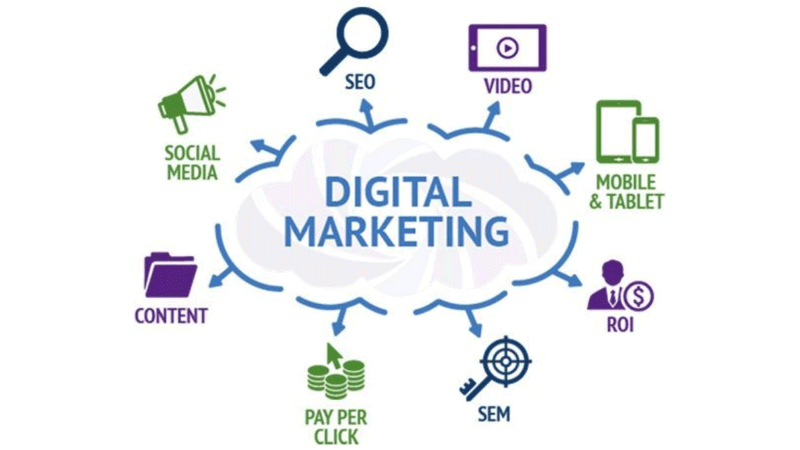Digital marketing provides several advantages to businesses by allowing them to reach a broader audience at a reduced cost. By leveraging various digital channels, companies can personalize their marketing messages to specific demographics and precisely target customers. Furthermore, digital marketing provides real-time feedback and analytics, enabling businesses to measure the effectiveness of their campaigns and make necessary adjustments promptly.
Some common digital marketing strategies include search engine optimisation (SEO), pay-per-click advertising (PPC), social media marketing, content marketing, email marketing, and mobile marketing. Each of these strategies has its strengths and weaknesses, and businesses may use one or several of them depending on their goals and target audience.
Businesses that want to remain competitive must therefore invest in digital marketing strategies to effectively reach and address their target customers.
In the present world, digital marketing has become a very important part of marketing strategies for businesses of all sizes. This is due to the shift towards a more technology and digital-driven world. With more people depending on internet devices for their daily needs, businesses need to meet them where they are.
Digital marketing offers a wide range of channels for businesses to reach their target audiences, such as social media, emails, search engines, and online advertising. This helps businesses gain greater flexibility and control over their marketing efforts, allowing them to target specific audiences with greater attention.
Digital Marketing Online Promotion- https://digitalsparrow.co/mastering-the-art-of-online-promotion/
Besides being precise, digital marketing also provides businesses with the strength to measure and track their marketing efforts. This enables them to make data-driven decisions and develop their marketing strategies over time. This can lead to greater returns on investment and better overall business conduct.
In general, digital marketing has become a basic requirement for businesses to succeed in today’s digital world. By using the power of digital channels, businesses can successfully reach their target audience and achieve their marketing objectives with greater precision and efficiency.
Digital marketing can be accomplished anywhere as long as there is an internet connection. It is not restricted to any particular location. It can easily reach a global audience. The use of digital channels allows businesses to connect with customers living in different countries and regions.
Online marketing platforms such as social media, email marketing, search engines, and mobile applications can be accessed from anywhere in the world. This flexibility allows businesses to target specific audiences and generate leads or sales in any location. For example, a company based in the United States can advertise its products or services to potential customers in Asia, Africa, or Europe with the click of a button.
Apart from being location-independent, digital marketing is also flexible in terms of timing. Businesses can run their campaigns 24/7 and reach out to their customers at any time of the day or night. This means that companies can promote their products or services to audiences in different time zones without having to bear any additional effort or cost.
Overall, digital marketing is a versatile tool that can be used anywhere in the world with an internet connection. By using digital channels, businesses can expand their reach and connect with customers from all over the world, regardless of their location.
Digital marketing has been around since the early 1990s when the first clickable web banner ad was introduced by AT&T. However, it wasn’t until the mid-2000s that digital marketing took off with the rise of social media platforms and the increased use of smartphones and other mobile devices.
The year 2004 saw the launch of Facebook, which quickly became the dominant social media platform and opened up new possibilities for targeted advertising. Google AdWords was also launched in 2004, allowing businesses to advertise on the Google search engine results page.

In 2006, Twitter was launched, and the following year, Apple introduced the iPhone, which changed the way people accessed the internet and consumed digital content. This led to the development of mobile marketing strategies such as mobile apps, mobile websites, and mobile advertising.
The rise of video-sharing platforms like YouTube and Vimeo also provided new opportunities for businesses to engage with their audience and create video marketing campaigns. In recent years, the use of artificial intelligence (AI) and machine learning (ML) has become increasingly prevalent in digital marketing, allowing for even more targeted and personalized campaigns.
Today, digital marketing is an essential part of any business’s marketing strategy, with businesses of all sizes investing heavily in online advertising, social media marketing, content marketing, and more.
One of the main advantages of digital marketing is the ability to target specific audiences precisely. Digital marketers can track as well as analyse consumer behaviour, preferences, and buying patterns with the help of data analytics. With the help of these analytics, marketers create campaigns specifically targeting and reaching out to their potential customers.
Another advantage of digital marketing is its scalability. Unlike traditional advertising methods, digital marketing allows businesses of all sizes to create and execute campaigns at a fraction of the cost. In addition, digital marketing campaigns can be launched and adapted quickly, allowing businesses to respond to changing market conditions and consumer needs.
Effective marketing techniques-https://startupadvice.in/increasing-the-growth-of-small-business-through-effective-marketing-techniques/
In summary, digital marketing offers businesses a cost-effective, targeted, and scalable way to reach their intended audience and promote their products or services. As consumers continue to spend more time online, digital marketing is becoming an increasingly important part of any business’s overall marketing strategy.
In summary, digital marketing is critical for modern businesses because of its cost-effective and targeted approach to reaching potential customers. It can be deployed through a variety of online channels, including social media, search engines and email. What began in the 1990s with clickable web banners has evolved with the advent of smartphones and AI technologies. Both AI and ML technologies play a vital role in understanding the target audience and leveraging data analytics in order to execute successful digital marketing campaigns. Therefore, businesses need to keep up with the latest trends and technologies to stay competitive in the ever-evolving digital landscape.


I don’t think the title of your article matches the content lol. Just kidding, mainly because I had some doubts after reading the article.
Thank you for your sharing. I am worried that I lack creative ideas. It is your article that makes me full of hope. Thank you. But, I have a question, can you help me?
Thank you for your sharing. I am worried that I lack creative ideas. It is your article that makes me full of hope. Thank you. But, I have a question, can you help me?